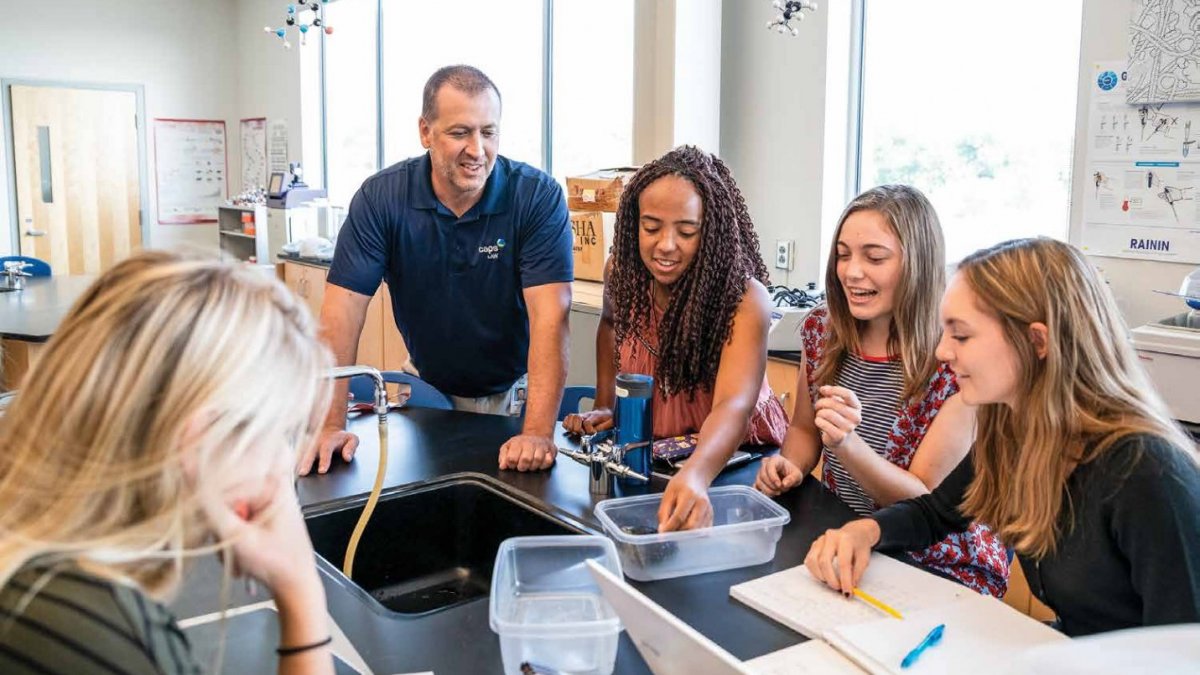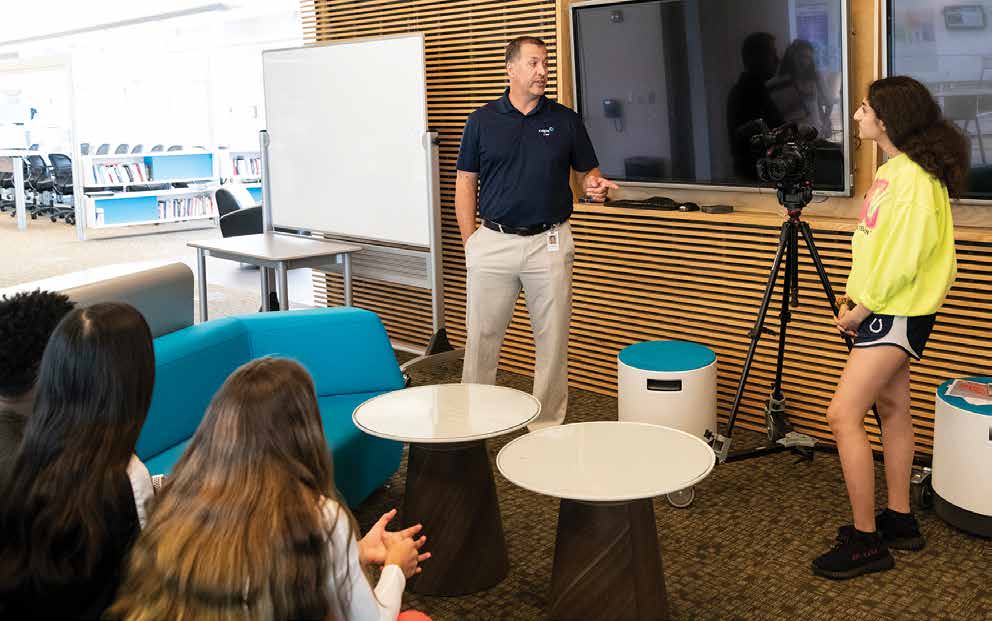Degree in 3: KU Edwards Campus’ accelerated program fast-tracks students for success

When Eric Fecteau turns 21 next year, he’ll have far more than a milestone birthday to celebrate.
He’s on track to graduate from KU in December 2019 with a degree in business administration, thanks to Degree in 3, an accelerated undergraduate degree path at KU Edwards Campus in Overland Park that helps qualifying students earn a bachelor’s degree one year early. Fecteau, the first Jayhawk expected to graduate from the program, will earn his in two and a half — a hefty accomplishment for a student who already owns his own business.
Fecteau runs Cutting Edge Lawn & Landscape, a full-service lawncare and landscaping provider in Olathe. The enterprise began about five years ago, when he and a friend started mowing neighbors’ yards to bring in extra cash. Business quickly took off, and Fecteau now manages his own routes and has hired a part-time employee. For at least eight months of the year, Fecteau works 40 to 55 hours a week, seven days a week while earning his KU degree.

The 2017 Blue Valley West graduate signed up for Degree in 3 when he was a sophomore in high school. After watching his two older brothers move away from the Kansas City area and rack up the steep costs associated with traditional four-year college degrees, Fecteau knew he wanted to explore other options. KU’s accelerated program fit the bill.
“Degree in 3 allowed me to still be at home and take advantage of the business that I’ve got and keep that going, pay for school as much as I can, and keep costs down,” says Fecteau, who also saves money by living at home with his parents. “All the KU classes are in the evenings, so I’m still able to work and have a lot of freedom during the day.”
With the Federal Reserve reporting our nation’s outstanding student debt at an all-time high of more than $1.5 trillion, Degree in 3 is an especially appealing time- and cost-efficient option for students interested in pursuing high-demand careers. Rather than committing to a four-year college degree plan, students in Degree in 3 earn dual credits in high school, complete an associate’s degree one year after graduating and finish a bachelor’s degree at the Edwards Campus two years later.
The savings can be substantial: For a freshman pursuing a liberal arts and sciences degree on the Lawrence campus, in-state tuition, course fees and books exceed $12,000 for 30 credit hours; room and board can add as much as $14,500. By comparison, Kansas students registered in Degree in 3 can expect to spend an average of $4,100 on tuition, books and fees during their first year at one of the Kansas City-area community colleges before transferring to KU Edwards Campus to complete their last two years of study. By living in the metro area, students can save even more.
The program began about four years ago when the Edwards Campus teamed up with Blue Valley Center for Advanced Professional Studies (CAPS) in Overland Park to create an accelerated degree path that would take advantage of the dual credits students were already earning in high school, as well as address the immediate workforce needs in the greater Kansas City area and across the nation. The program’s first offering was a bachelor’s degree in information technology.
Since then, Degree in 3 has expanded to include the following degrees:
- biotechnology
- business administration
- exercise science
- law and society
- literature, language and writing
- molecular biosciences
- public administration
The program also has grown to include 10 educational partners in the Kansas City metro area:
- Blue Valley Schools
- Johnson County Community College
- Kansas City Public Schools
- Kansas City Kansas Community College
- KU Edwards Campus
- Metropolitan Community College
- Olathe Public Schools
- Raytown Quality Schools
- Shawnee Mission School District
- Summit Technology Academy
Though Degree in 3 first started taking shape several years ago, the program was formalized in June with a signing event at the Edwards Campus.
“The fact that we had this event where the heads of community colleges were in the same room with a number of superintendents and leadership from all these different school districts, I think that was really unique,” says David Cook, g’96, PhD’99, vice chancellor at the Edwards Campus. “I would venture to say that hasn’t happened before where all of us were in the same room. And I think it speaks to what everybody thinks is the power or the potential of this program.”
Lauren Roberts McEnaney, Degree in 3 adviser and education program coordinator at the Edwards Campus, explains that the name “Degree in 3” is derived not only from the three diplomas students will earn in three years, but also from three core elements of the program: educational partners, student services and industry associates in Kansas City.
As soon as students register for Degree in 3, they work closely with McEnaney for guidance and academic counseling to ensure they’re completing the coursework needed to finish on time. “Students also work with their high school counselors and their community college counselors, once they reach that level,” she says. “I tell students we’re a three-person team.”

Dual credit courses or concurrent enrollment options for high school students vary from school to school, even within the same district, explains McEnaney, g’13. “They’re mostly what you might think of as traditional educations: English composition, college algebra or calculus, American history, biology,” she says. “When you’re looking at one of the career academies, those get a little more specific, which is great for students.”
At Blue Valley CAPS, students sign up for courses in a variety of disciplines, including biosciences, engineering, business, human services, and medicine and health care, all while learning real-world, project-based skills.
“We want them emulating whatever their future career choice may be,” says Chad Ralston, director of Blue Valley CAPS, which has been in Kansas City since 2009 and is the first of 39 CAPS programs nationwide. “We’re giving them an opportunity to try it out, maybe rule it out. That way, before they even get to the university level, they’re able to articulate a little bit more clearly what kinds of careers might align to their strengths, their passion and their purpose.”
Ralston explains that all of the CAPS curriculum is built in partnership with industries, as well as high schools and postsecondary learning institutions. That means students work directly with local and global clients, which include small startup companies, large corporations, nonprofit organizations, and area medical centers and universities, including KU.
“At the very beginning we learned: Get the students out of here,” says Ralston, d’94, g’98. “Get them into industry; get them connected to what’s out there.”
Fecteau participated in CAPS his senior year in high school, taking courses in economics and global business and working on a team with two other students to organize a donation drive for Goodwill in Kansas City. “What was nice about CAPS is that they tie in the real-world experience,” he says. “I’ve seen a lot of material in my college courses that relates back to CAPS.”

Kelechi Ofodu, a 17-year-old Missouri resident who signed up for Degree in 3 two years ago, had a similar experience at Summit Technology Academy in Lee’s Summit, Missouri. The 2018 Lee’s Summit High School graduate, who starts classes at Metropolitan Community College this fall and plans to become a physical therapist, participated in the career academy’s yearlong allied health path, which allowed her to engage in valuable hands-on labs and health care courses. She finished her experience shadowing several local physical therapy professionals, all while earning credits toward her undergraduate degree at KU.
Summit Technology Academy (STA) joined KU Edwards Campus last year as a partner in Degree in 3. For the past 20 years, the STEM-based school has been preparing students from 30 area high schools for high-wage, high-demand careers in engineering, computer science, human services and finance, and arts and communications, but it hadn’t yet developed a health care path.
Jeremy Bonnesen, director and principal at STA, was eager to add another degree option to the academy’s portfolio. “With KU’s tremendous reputation for health care,” he says, “this provides a great opportunity for students. It was a great opportunity for us to grow.”
STA also participates in the Missouri Innovation Campus program, an intensive, two-year accelerated degree path that requires students to take courses off-site at the local community college and participate in internships as seniors in high school. Bonnesen appreciates that KU offers a comparable, but less rigid, experience for students. “The nice thing about Degree in 3 is that it provides a little more flexibility,” he says. “Students can still go to their high school during their senior year.”
Students like Ofodu can also take advantage of Edwards Campus’ MetroRate, which offers in-state tuition costs for Missouri residents. “That drops my tuition even more,” she says.
With one older sister who just completed law school in California, another in medical school at the University of Missouri-Kansas City and a third earning a degree in film from Georgia State University — not to mention twin brothers in high school — it’s important for Ofodu to reduce the cost of her education as much as possible and relieve some of her parents’ financial burden by working while pursuing her degree, something that taking classes at KU Edwards Campus will allow her to do.
“My parents do help,” she says. “They just don’t want us to break our backs doing anything; they’d rather break theirs. But that makes me want to say, ‘OK, I’ve got to save up and make my own money, so I can take a little bit of stress off of them.’”

With more than 4,000 area high school students currently enrolled in dual credit courses through Johnson County Community College in Overland Park, Joe Sopcich, president of the college, knows the value of getting a head start on postsecondary education. Though not all of these students will register for Degree in 3, he considers the program an excellent solution for students looking to reduce their college costs.
“It’s not for everybody, but there’s a lot of students who are focused on just getting their degree and moving on in the career world,” says Sopcich, PhD’05, who uses Fecteau, the first student to attend JCCC on the second leg of the Degree in 3 path, as an example. “Degree in 3 isn’t meant to cannibalize anything; it’s just meant to provide another opportunity for students.”
By creating degree paths for relevant, regionally high-demand careers, David Cook hopes that Kansas City students will want to stay in the metro area—for work or graduate school—after completing the program. “We’re identifying these smart, talented kids when they’re here and exposing them to opportunities locally,” he says. “Certainly, part of what we’re hoping for is keeping great talent close to home.”
By creating degree paths for relevant, regionally high-demand careers, David Cook hopes that Kansas City students will want to stay in the metro area—for work or graduate school—after completing the program. “We’re identifying these smart, talented kids when they’re here and exposing them to opportunities locally,” he says. “Certainly, part of what we’re hoping for is keeping great talent close to home.”
The industry partners that students work with at professional secondary-learning centers like Blue Valley CAPS or Summit Technology Academy help strengthen those community ties.
“The trend that we’ve seen here is that when students engage with a business partner, be it through a project or a traditional internship, they are very likely to continue that relationship and eventually create a job opportunity or a future career with that same company,” Chad Ralston says.
Degree in 3 students are exposed to even more industry professionals once they arrive at KU Edwards Campus. “Most of our professors are professors of practice,” says Carolyn McKnight, director of community relations and business development at the Edwards Campus. “They’ve been out in the industry working, they come back, get their PhDs and start teaching here. They have great connections out in the workforce.”
For students like Eric Fecteau and Kelechi Ofodu, who will graduate from the program in just a few short years, those connections—and the Degree in 3 experience itself—could create the ultimate foundation for future success.
Top photo: Chad Ralston, director at Blue Valley CAPS in Overland Park, visits with high school students participating in a bioscience lab. Photo by Steve Puppe.
This article originally published in the Issue No. 5, 2018, edition of the Kansas Alumni Magazine.
Are you a KU graduate? Stay in touch with your alma mater through the KU Alumni Association and subscribe to the Kansas Alumni Magazine.





